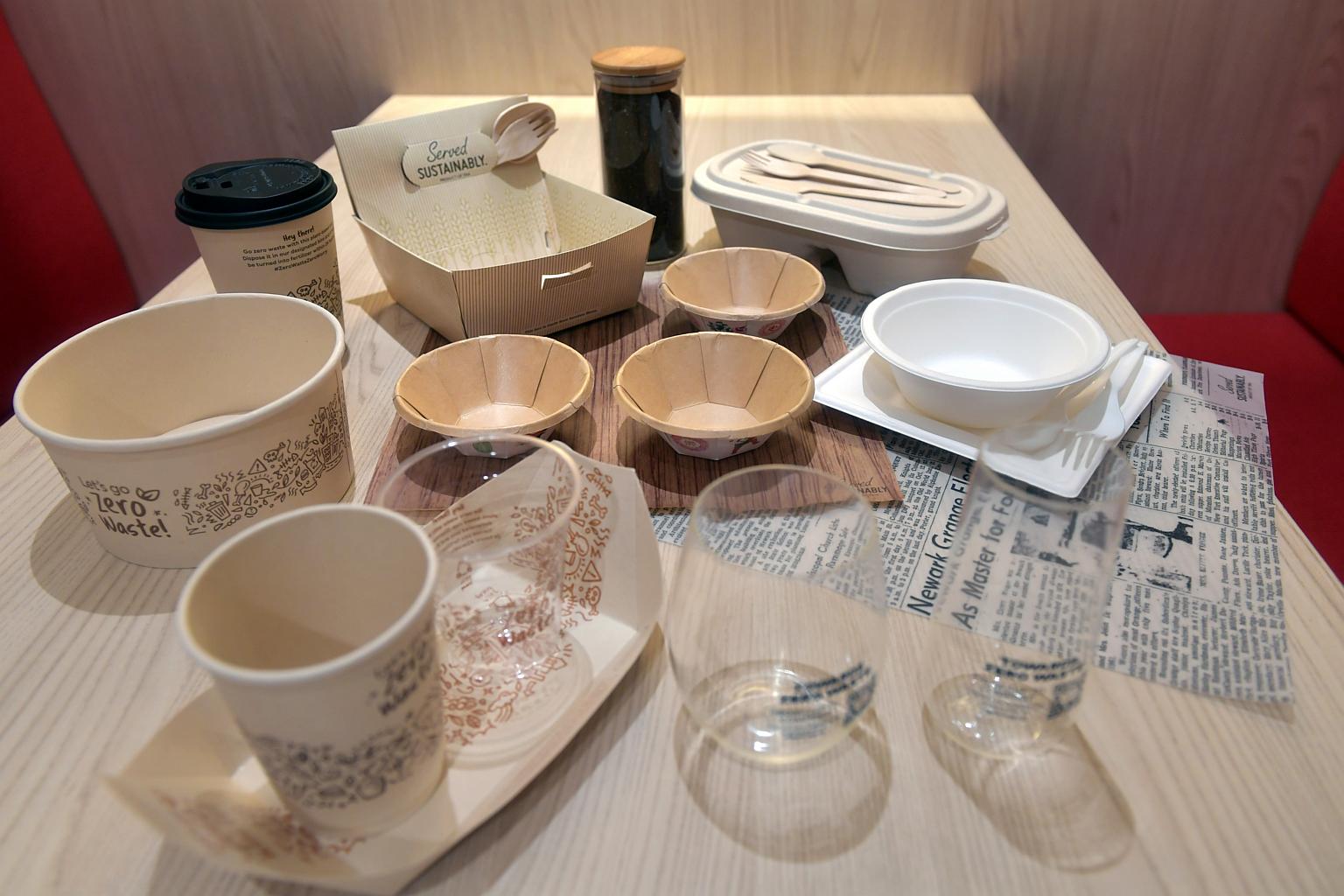2 start-ups emerge winners in contest held to help Sats manage food, packaging wastes
Sign up now: Get ST's newsletters delivered to your inbox

Food containers and cups made using a plant-based material developed by one of the winning start-ups, Tria.
ST PHOTO: ALPHONSUS CHERN
SINGAPORE - A United States-based start-up will soon convert single-use plastic and food waste from planes into alternative energy for inflight caterer and ground handler Sats.
Enexor BioEnergy and another company - local start-up Tria - emerged champions of an inaugural sustainability competition organised by OCBC Bank to help its corporate customer, Sats, manage its food and packaging wastes.
Tria develops food containers and cups using a plant-based material, which can be broken down into compost and biofuel upon disposal.
The two winners will each receive up to $80,000 in funding from OCBC, and pilot their solutions with Sats.
Burning plastic trash to generate electricity can be dangerous because it could emit toxic pollutants and release metals into soil and groundwater.
But Enexor uses a patented combustion process that breaks down plastic, food and organic waste at a molecular level, leaving the inorganic elements such as metals to be collected as ash.
The combustion process, called thermal oxidation, ensures that the waste is completely broken down without forming significant toxic nitrogen oxides - a key component of air pollution which is typically associated with the combustion of fossil fuel.
The inorganic ash can be used in industrial applications - if the metals are valuable - or mixed into asphalt or concrete for construction work, said Enexor founder and chief executive Lee Jestings on Monday.
He was speaking to the media at a briefing which announced the two winners of the OCBC Sustainability Innovation Challenge.
Enexor's solution - a container-like system called Bio-CHP - is believed to be the world's first micro-turbine fuelled by organic waste.
Food waste, plastics and other organic waste such as sawdust and cardboard can be thrown into the system's chute.
The waste will undergo combustion, and the resulting hot gases will be filtered to remove the inorganic particles. The gases will be further processed before they go into a micro-turbine to produce power and thermal energy.
One Bio-CHP container can generate 110 kilowatts of electricity.
"Our solution works well with micro-grids and when combined with solar technologies," added Mr Jestings.
Commenting on Enexor’s solution, Professor Subodh Mhaisalkar from Nanyang Technological University’s School of Materials Science and Engineering said the filtration step ensures that no pollutants in either gaseous or particulate form are released.
But the filtration system may need to undergo regular maintenance, he added.
By the fourth quarter of 2023, Enexor might set up a Bio-CHP system at Changi Airport, and the electricity generated could be used to power Sats' catering operations.
As for the pilot involving Tria, passengers onboard some Singapore Airlines aircraft could soon have their meals served in plant-based containers.
Sats chief data and sustainability officer Spencer Low said the firm will discuss and finalise the scope of the pilots with Tria and Enexor shortly.
Tria uses an in-house process that sees soiled containers and food scraps being broken down into their elemental forms.
The waste then undergoes anaerobic digestion to be turned into biofuel for energy and compost for agriculture.
Tria recently partnered with KFC's Northpoint City branch to trial its plant-based containers.
Between January and September 2021, Sats received more than 250 tonnes of mixed waste each month, including that from inbound flights at the Changi Airport hub.
Mixed waste is also generated from its institutional and other catering businesses.
Mr Low said that both Enexor and Tria were selected due to their ability to scale-up and because the waste stream from Sats does not need to be segregated before the start-ups come in - which reduces the time and logistics needed.
"The challenge with aviation waste is that they are hard to segregate on the plane," he added.


